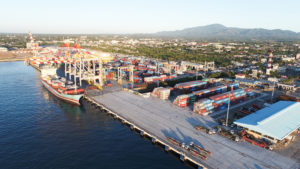
The coronavirus (COVID-19) pandemic cut container throughput at terminals operated by Asian Terminals Inc. (ATI) by double-digit in for the first four months of the year.
ATI executive vice president William Khoury in an online stockholders’ meeting on June 4 said the company does not expect significant recovery in volumes until at least August.
From January to April, container volume at Manila South Harbor declined by 26% and at Batangas Container Terminal (BCT) by 28% year-on-year, according to Khoury.
“With this recovery, we still expect full year volume to be around 20-30% in our last year’s levels,” he added.
In an earlier statement, ATI said volumes handled in Manila South Harbor and BCT for the first quarter of 2020 dropped 20.8% and 18.8%, respectively, as global and regional markets temporarily shuttered to mitigate the spread of COVID-19.
READ: Lower container volumes drag ATI Q1 income by 57.5%
The company’s financial performance for 2020 is also “not expected to be at par with last year’s.”
Restrictions due to COVID-19 likewise affected ATI’s expansion program.
Khoury said ATI has reviewed its capital expenditures (capex) plan and “we are being responsible with our proposed expansion programs so some of our programs have been delayed for few months.”
He added that major programs will continue “after we can come back to work full, hopefully during the MGCQ (modified general community quarantine).” Metro Manila and Batangas are currently under general community quarantine.
In terms of total value of capex delayed, Khoury said “it’s about US$90 million delayed until next year.”
Amid the pandemic, ATI’s ports have remained operational 24/7, joining frontline industries and supporting government agencies in ensuring the unhampered flow of food, medicines, medical supplies and other vital commodities in the supply-chain, especially at the time of the health emergency, according to ATI chairman Andrew Hoad during the same meeting.
ATI also augmented its donations and community investment programs to help mitigate the impact of COVID-19 to its surrounding communities.
In line with its corporate sustainability program, ATI sent truckloads of rice and ready-to-eat canned goods through the social welfare unit of the City of Manila and distributed relief goods to surrounding port communities to help families remain afloat during the crisis.
ATI also made available its Passenger Terminal Building at Manila South Harbor’s Pier 15 as an added temporary COVID-19 quarantine facility for repatriated overseas workers in partnership with the Department of Transportation, Philippine Ports Authority, Philippine Coast Guard and other private sector donors. Pier 15 is also hosting two floating hospital vessels serving the same purpose.









